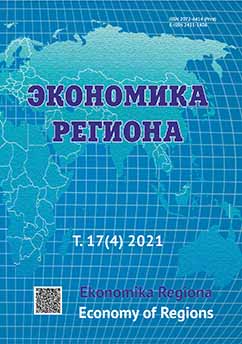Воспроизводственные процессы в недропользовании как основа устойчивого социально-экономического развития нефтедобывающих регионов
Reproduction Processes in Subsoil Use as the Basis for Sustainable Socio-Economic Development of Oil-Producing Regions
Author(s): Irina Valeryevna Sharf, Alexander Alexandrovich MikhalchukSubject(s): Economy, Geography, Regional studies
Published by: Институт экономики Уральского отделения Российской академии наук
Keywords: oil; production; increase in reserves; geological exploration; gross regional product; personal income; Cobb-Douglas production function; sustainability; imbalance
Summary/Abstract: There are numerous studies on different aspects of the impact of hydrocarbon production on Russian economy. Nevertheless, direct and indirect effects of reserve reproduction on social and economic development of oil-producing regions have been insufficiently assessed, even though it differs due to various macroeconomic processes and existing state mechanisms of subsoil use. The present paper examines the upstream sector of the petroleum industry comprising hydrocarbon exploration and production. The research hypothesis states that an imbalance in subsoil use results in growing inequality of socio-economic development of Russian regions, while the expansion of geological exploration work will reduce this effect. The study analyses the influence of geological exploration, leading to an increase in oil reserves and oil production, on gross regional product (GRP) per capita and personal income. For that purpose, the analysis was performed based on statistical data on five regions of the Russian Federation using the Cobb-Douglas production functions. According to the results obtained for blocks of the proposed regression model, Russian regions were divided into clusters in terms of the input effect on expected results. Overall, the influence of oil production on GRP per capita and average income is more significant compared to an increase in oil reserves. Moreover, the impact of the upstream sector in Tomsk oblast is stronger than in other constituent entities of the Russian Federation. The existing regional imbalance in social-economic development depends on not only available natural capital and tax relief system in subsoil management, but also differences in economic development and the role of petroleum industry in the analysed regions. In the context of recession, the expansion of geological exploration is required to increase natural capital that would provide the income many times higher than investments at the upswing of the cycle. The study results can be used for petroleum industry management in the field of geological exploration to justify the use of financial and fiscal incentives.
Journal: Экономика региона
- Issue Year: 17/2021
- Issue No: 4
- Page Range: 1286-1301
- Page Count: 16
- Language: Russian

